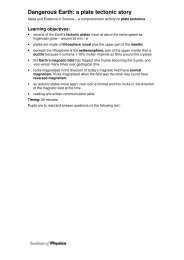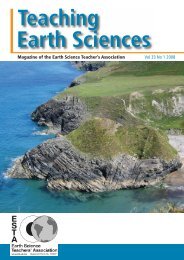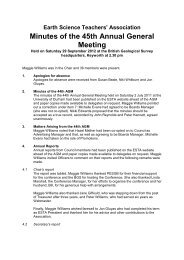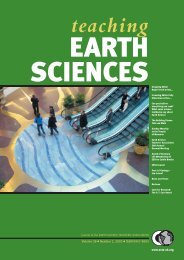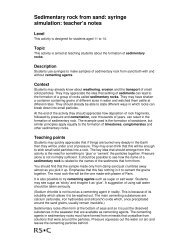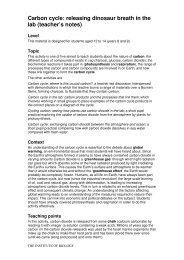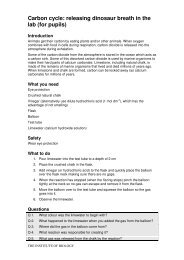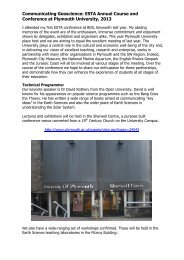teaching - Earth Science Teachers' Association
teaching - Earth Science Teachers' Association
teaching - Earth Science Teachers' Association
You also want an ePaper? Increase the reach of your titles
YUMPU automatically turns print PDFs into web optimized ePapers that Google loves.
TEACHING EARTH SCIENCES ● Volume 31 ● Number 4, 2006<br />
Does gender matter in science?<br />
An article by Ben A Barres in inSECT, the<br />
newletter from the Wales’ Resource<br />
Centre for Women in <strong>Science</strong>,<br />
Engineering and Technology, notes that<br />
some Professors have suggested that<br />
women are not progressing in science<br />
because of an innate inability rather than<br />
discrimination. In his book Manliness,<br />
Harvey Mansfield, a Harvard Professor,<br />
states that women don’t like to compete,<br />
are risk adverse, less abstract and too<br />
emotional. Barres argues that available<br />
scientific data do not provide credible<br />
Rolls-Royce <strong>Science</strong> Prize<br />
support for these suggestions – but<br />
instead support the hypothesis that<br />
women are not advancing because of<br />
discrimination. In her book Why so slow?<br />
Virginia Valian highlights many studies<br />
demonstrating a substantial degree of bias<br />
against women. She says “Simply raising<br />
expectations for women in science may be<br />
the single most important factor in<br />
helping them make it to the top”.<br />
Further information about inSECT<br />
and to receive a copy of the newsletter<br />
Tel: 029 2049 3351<br />
Just think of any science <strong>teaching</strong> project idea that meets a need in your school or<br />
college and send it in online. Register on the website and receive monthly newsletters<br />
and guidance on how to put together an entry. Deadline for entries 28 February<br />
2007. Register now on www.rolls-royce.com/scienceprize<br />
1,000 candidates sit GCSE Astronomy<br />
For the first time since the introduction of the GCSE in the late 1980s, over one<br />
thousand candidates sat the GCSE examination in Astronomy. This summer’s largest<br />
ever cohort maintained the high standards shown in previous years, with 75% of<br />
students gaining an A* - C grade. There has also been a shift in the composition of<br />
students. Although originally a qualification taken mostly by adults and sixth form<br />
students (years 12 and 13) the past few years have seen a steady rise in the number of<br />
secondary schools beginning to run the course as a GCSE option for Key Stage 4<br />
students (years 10 and 11) or even as an ‘early start’ GCSE course for year 9 students.<br />
For many schools this provides a popular component within a <strong>Science</strong> Specialist<br />
School or Gifted and Talented provision.<br />
From an article by Julien King (Principal Moderator for GCSE Astronomy<br />
Edexcel Examinations) in Gnomon, the Newsletter of the <strong>Association</strong> of<br />
Astronomy Education, Vol. 26, No. 1, Autumn 2006.<br />
A new science resource website from the ASE<br />
From January 2007 www.schoolscience.co.uk (sponsored by industrial partners and<br />
providing free on-line resources) will merge with the <strong>Association</strong> for <strong>Science</strong><br />
Education’s (ASE’s) www.scienceonestop.com (the information resources<br />
directory) to provide an enhanced resources site simply called<br />
www.schoolscience.co.uk and managed and administered by the ASE.<br />
The site will be free for all users and aims to provide a comprehensive directory of<br />
resources, information and contacts for teachers and learners of science everywhere.<br />
Further details contact Rebecca Dixon-Watmough on<br />
Tel: 01254 247764 or Rebecca@ase.org.uk<br />
Giving scientists<br />
some good press<br />
New York University’s film school is<br />
one of six schools across the US<br />
where students are eligible to receive<br />
award money from the Alfred P Loan<br />
Foundation for incorporating science<br />
into their films. Winning films are<br />
then featured on the Sloan <strong>Science</strong><br />
Cinematheque Web site. Creators of<br />
Sloan <strong>Science</strong> Cinematheque cite<br />
Apollo 13 starring Tom Hanks, as a<br />
prime example of a film that brings<br />
science to broad audience with good<br />
excitement and drama.<br />
From an article in Kathryn Hansen<br />
in Geotimes July 2006, pp 46-47.<br />
Wow and Vow<br />
In an article about the experiences of<br />
primary science teachers and when they<br />
were exposed to a new and innovative<br />
<strong>teaching</strong> strategy for the first time,<br />
Nelofer Halal noted that one teacher<br />
went through at least three stages that<br />
were termed:<br />
● Wow and vow<br />
● Muddling through<br />
● Second thoughts stage<br />
The challenge for teacher educators is to<br />
design and implement <strong>teaching</strong> strategies<br />
where the teachers can undergo 203<br />
cycles of the ‘muddling through’ stage<br />
and to finally integrate these new ideas<br />
into their pre-workshop repertoire of<br />
<strong>teaching</strong> tools.<br />
<strong>Science</strong> Education International,<br />
Vol. 17, No. 2, June 2006, pp 123-132.<br />
33 www.esta-uk.org



